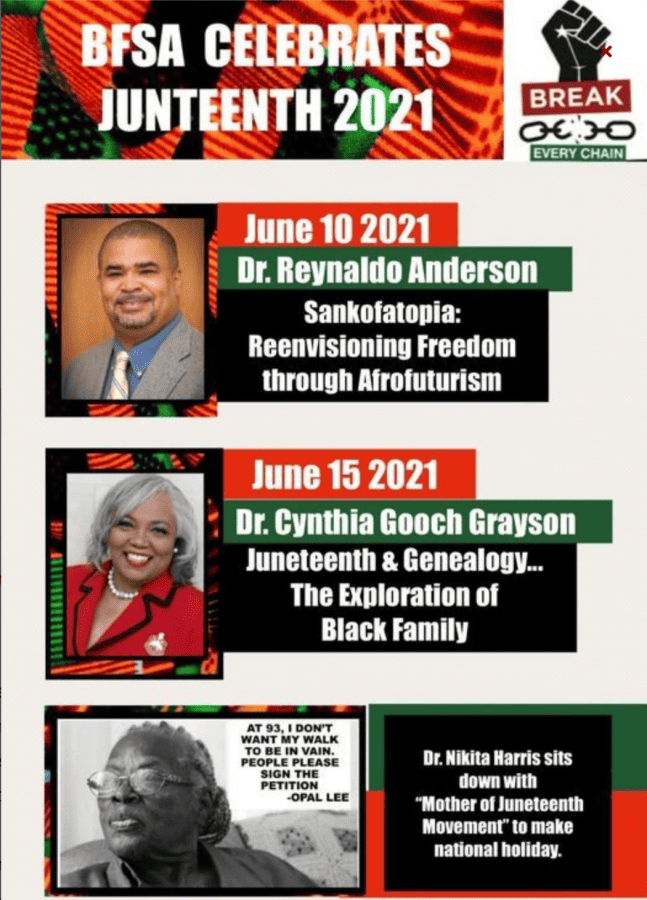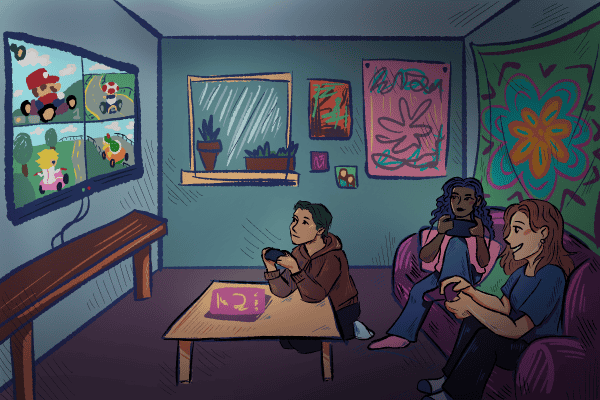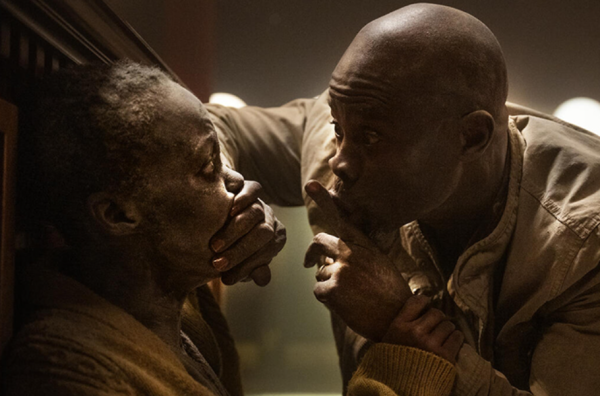UA observes Juneteenth in month-long celebration
June 18, 2021
The UA Black Faculty and Staff Association hosted a three-day Juneteenth Observation speaker series this week, and the final installment is scheduled for Saturday, June 19.
“We celebrate July 4, 1776 as one of our freedom days in terms of civil liberties, but at that time, Black people and Africans were still enslaved in America. Juneteenth is important because it really is a day of freedom for all people in America,” said Nikita Harris, UA assistant professor of communication studies and chair of BFSA’s Juneteenth observance.
The series featured three academics who discussed Black Americans’ progress since June 19, 1865. The organization also promoted a petition to make Juneteenth a federal holiday.
“I wanted [the series] to be an opportunity for people to learn more about Juneteenth and to show the relevance of Juneteenth today and [in] our futures,” Harris said.
Harris said Juneteenth should be a celebration for everyone, but she also explained why Juneteenth is especially important to Black people.
“Juneteenth is a celebration of freedom, but it’s also a celebration of family — Black family. Family is an important part of freedom and [the] Juneteenth celebration,” Harris said. “To be able to be with your family, to be able to love your family and to be able to say you are a family unit, that was very much what a lot of enslaved people wanted.”
Sankofatopia: Reenvisioning Freedom through Afrofuturism
The first Juneteenth Observation on June 10 featured Reynaldo Anderson, an associate professor of communication studies and Africana studies at Harris-Stowe State University.
The presentation focused on Afrofuturism, a term that originally described African American literary fiction, but later referred to the cultural aesthetic that combines science fiction, history and fantasy to explore the African American experience and connects those from the Black diaspora with their forgotten African ancestry.
Anderson also discussed Sankofatopia, a term that combines the words Sankofa, meaning to look back on the past in order to make forward progress, and utopia.
He reflected on African American contributions that directly correspond to the idea of Sankofa, discussed the progress made since June 19, 1865 and talked about Black historical figures who made that change happen.
Anderson used the idea of Sankofa, looking back on the past, to reflect on how Black Americans can move forward.
Before Anderson dived into his topic, Marvin Adams, a UA senior majoring in communication studies and the BFSA Juneteenth 2021 Student Poet, opened the presentation.
Adams said he has been writing poetry since 2014 and was glad to use his creativity “to open people up to so many perspectives and avenues.”
“Right now, I think what we’re seeing is getting close to the resemblance of what we saw in the Harlem Renaissance, where poetry and jazz and creativity [were] thriving,” he said. “I think we’re getting back to that, and people are learning to appreciate art a little bit more.”
Adams said he hopes his poem and his part in the BFSA Juneteenth celebration inspires people to love each other and work toward a better future.
“Spread love, be unbiased and spread unconditional love to everybody. That’s the way that we move forward and carry on and make change […],” Adams said. “What I wanted people to get from this is that no matter where we are, no matter how much work we have to do, there is still hope for a better day ahead.”
Juneteenth and Genealogy: The Exploration of Black Family
Along with using poetry and art to advocate for Black history, some are using genetic technology to educate African Americans about their personal histories.
During her presentation on June 14, Cynthia K. Gooch-Grayson, an associate vice president for equity and inclusion at Metropolitan Community College, said it’s important for Black Americans to research their pasts.
“It can be empowering,” Gooch-Grayson said. “It can help with missing puzzle pieces. It gives names to [the] nameless and voices to [the] voiceless.”
During slavery, she said Black histories were erased and many Black Americans today know little about their ancestries. By learning about their families’ pasts, Gooch-Grayson said African Americans can identify oppression, give a voice to their ancestors and become empowered through self-discovery.
She said the family tree helps Black people better celebrate Juneteenth because they can understand their families’ strengths through their experience with oppression.
“I hope that they are encouraged to research their family background. I hope in their celebration of Juneteenth they do that,” she said. “In fact, colleges should take steps to ensure Juneteenth is remembered by their students so that African American history is preserved and voiced.”
Gooch-Grayson said she hopes schools like The University of Alabama conducting programming during Juneteenth to educate their staff, students, faculty and communities.
Sitting Down with the “Grandmother of Juneteenth”
BFSA’s Juneteenth celebration will continue on Saturday, June 19, with a prerecorded interview between Harris and Opal Lee, an educator and social activist who has been proclaimed the “grandmother of Juneteenth.”
Lee began advocating to make Juneteenth a national holiday in 2016 at age 89, when she began walking 2.5 miles annually to represent the 2.5 years it took for all enslaved people to be freed.
Harris and Gooch-Grayson both advocated for people to sign Lee’s petition to make Juneteenth a national holiday.
Gooch-Grayson said Juneteenth is commonly omitted from history books. However, she believes it’s important for Americans to learn about the experiences and contributions of African Americans.
Harris said she knows there is still progress to be made in the movement for Black rights.
“African Americans are re-examining what it means to be free. I think we’re at that point again where we’re asking that question: What does freedom look like for us moving forward? What does equality look like for us moving forward? What does justice look like for us moving forward? And we’re at the point where we have the opportunity to envision and create different paths towards that,” Harris said.
The endless push for recognition has not gone unnoticed. On June 17, just days before Juneteenth, President Biden signed a bill making Juneteenth a federal holiday.
For those interested in learning more, Gooch-Grayson and Anderson’s presentations can be found on the BFSA Facebook page. The interview with Opal Lee will be available on the BFSA website from June 19 to July 4.











